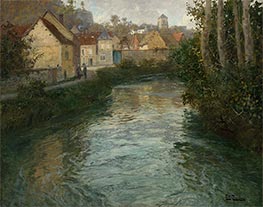Frits Thaulow Painting Reproductions 1 of 1
1847-1906
Norwegian Impressionist Painter
Frits Thaulow was a prominent Norwegian Impressionist painter known for his landscapes and urban scenes. He was born on October 20, 1847, in Christiania (now Oslo), Norway. Thaulow's artistic talent was evident from an early age, and he received encouragement and support from his parents.
At the age of 17, Thaulow enrolled at the Royal School of Drawing in Christiania, where he studied under renowned Norwegian landscape painter Hans Gude. Gude's influence on Thaulow's work can be seen in his early landscapes, which often depicted the rugged beauty of the Norwegian countryside.
In 1870, Thaulow traveled to Paris to further his artistic education. He studied at the École des Beaux-Arts under French painter Henri Lehmann and also took classes at the Académie Suisse. During his time in Paris, Thaulow became acquainted with several influential artists, including Claude Monet and Pierre-Auguste Renoir. Their work, along with the emerging Impressionist movement, had a profound impact on Thaulow's artistic style.
Thaulow's paintings are characterized by their vibrant colors, loose brushwork, and emphasis on capturing the effects of light and atmosphere. He often painted en plein air, directly observing and capturing the natural scenes before him. His favorite subjects included rivers, canals, and harbors, which he depicted with great skill and precision.
In addition to landscapes, Thaulow also painted urban scenes, particularly those featuring Paris and other European cities. His cityscapes often showcased the bustling streets, bridges, and architecture, infused with his unique Impressionistic style.
Thaulow's talent gained recognition, and he received numerous awards and honors throughout his career. He exhibited his works in major art exhibitions across Europe and the United States, earning critical acclaim and establishing himself as one of the leading artists of his time.
In 1880, Thaulow married Alexandra Lasson, a talented artist in her own right. They had one daughter together, Helga Thaulow, who also became a painter.
Thaulow's career took him to various locations, including Norway, France, England, Italy, and the Netherlands. He drew inspiration from these different landscapes, constantly evolving his artistic approach. His ability to capture the essence of a scene and evoke a sense of mood and atmosphere made him a highly sought-after painter.
Frits Thaulow continued to paint and exhibit his work until his death on November 5, 1906, in Volendam, the Netherlands. His legacy lives on through his stunning paintings, which can be found in museums and private collections worldwide. Thaulow's contributions to the Impressionist movement and his ability to capture the beauty of nature and urban life make him a significant figure in the history of art.
At the age of 17, Thaulow enrolled at the Royal School of Drawing in Christiania, where he studied under renowned Norwegian landscape painter Hans Gude. Gude's influence on Thaulow's work can be seen in his early landscapes, which often depicted the rugged beauty of the Norwegian countryside.
In 1870, Thaulow traveled to Paris to further his artistic education. He studied at the École des Beaux-Arts under French painter Henri Lehmann and also took classes at the Académie Suisse. During his time in Paris, Thaulow became acquainted with several influential artists, including Claude Monet and Pierre-Auguste Renoir. Their work, along with the emerging Impressionist movement, had a profound impact on Thaulow's artistic style.
Thaulow's paintings are characterized by their vibrant colors, loose brushwork, and emphasis on capturing the effects of light and atmosphere. He often painted en plein air, directly observing and capturing the natural scenes before him. His favorite subjects included rivers, canals, and harbors, which he depicted with great skill and precision.
In addition to landscapes, Thaulow also painted urban scenes, particularly those featuring Paris and other European cities. His cityscapes often showcased the bustling streets, bridges, and architecture, infused with his unique Impressionistic style.
Thaulow's talent gained recognition, and he received numerous awards and honors throughout his career. He exhibited his works in major art exhibitions across Europe and the United States, earning critical acclaim and establishing himself as one of the leading artists of his time.
In 1880, Thaulow married Alexandra Lasson, a talented artist in her own right. They had one daughter together, Helga Thaulow, who also became a painter.
Thaulow's career took him to various locations, including Norway, France, England, Italy, and the Netherlands. He drew inspiration from these different landscapes, constantly evolving his artistic approach. His ability to capture the essence of a scene and evoke a sense of mood and atmosphere made him a highly sought-after painter.
Frits Thaulow continued to paint and exhibit his work until his death on November 5, 1906, in Volendam, the Netherlands. His legacy lives on through his stunning paintings, which can be found in museums and private collections worldwide. Thaulow's contributions to the Impressionist movement and his ability to capture the beauty of nature and urban life make him a significant figure in the history of art.
1 Frits Thaulow Paintings

Picquigny 1899
Oil Painting
$892
$892
Canvas Print
$73.89
$73.89
SKU: FTW-19096
Frits Thaulow
Original Size: 73 x 92 cm
Metropolitan Museum of Art, New York, USA
Frits Thaulow
Original Size: 73 x 92 cm
Metropolitan Museum of Art, New York, USA